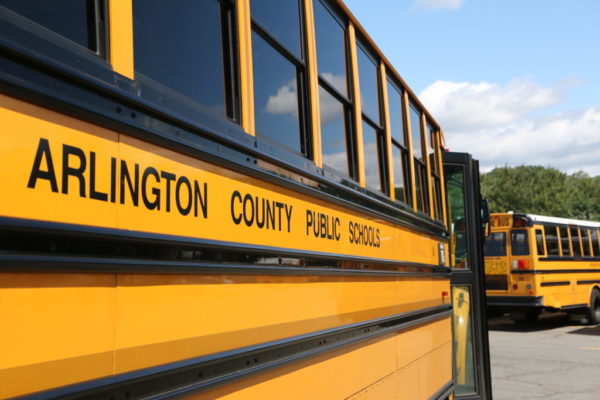(Updated at 3:50 p.m.) Arlington Public Schools is seeking public input on a new plan officials hope will help protect transgender students from discrimination.
The Policy Implementation Procedure (PIP) released yesterday (Tuesday) contains several ways the county’s public school system plans to fulfill a 2015 policy promising protections for transgender and non-binary student from harassments, and to ensure these students had the same educational opportunities as their peers.
The three-page document outlines several ways schools can accomplish this, including:
- Converting some single stall bathrooms into gender neutral bathrooms, and allowing students to use bathrooms that are consistent with their identity
- Assigning students to rooms during overnight trips that match their gender identity, and allowing any student who is “uncomfortable sharing” a sleep area, or shower or bathroom, to access a “designated safe, non-stigmatizing alternative”
- Requiring teachers to refer to students by their preferred names and pronouns
- Directing staff to not share information about a student’s gender identity and gender transition “unless legally required to do so,” or unless the student gives permission to share
In an email shared with parents, APS noted that the PIP was developed with input from the National School Boards Association’s Transgender Students in Schools Guide. Residents can submit feedback on the plan via an online survey or by emailing [email protected].
“In keeping with the APS vision and core values, this PIP is being developed to ensure that all students feel accepted and safe in inclusive school environments, including our transgender and gender non-conforming youth,” Dr. Tara Nattrass, assistant superintendent of Teaching and Learning, said in a statement to ARLnow.
Dr. Julie Alexandrin, Arlington Gay Lesbian Alliance board member and education psychology expert, praised the plan for its thoroughness and inclusive definitions of gender. However, she said, “the real question will be the implementation and how people are held accountable to it — not just faculty and staff but also students.”
When it comes to sports, the PIP proposes that students be able to “participate in any co-curricular or extra-curricular activity consistent with their gender identity” but notes that “athletic participation regulated by the Virginia High School League (VHSL) and the Virginia Scholastic Rowing Association (VASRA) must be in compliance with rules outlined by that organization.”
“That shows us where our next battle is,” said Alexandrin. She added that it’s important the county follow the state rules in order not to disqualify current athletes in sports like crew, which recent funding battles revealed has a strong fan base.
“There’s only so much the school system can do without hurting the students,” she said.
The plan generated controversy among some who opposed special anti-discrimination policies based on gender identity. Several opponents aired frustrations in blog posts, and two criticized the School Board during an April 11 meeting for not sharing more information during the PIP drafting process.
One public speaker at the April meeting said the PIP features a “presumption of gender fluidity and a heavy emphasis on supporting and education about gender transition” and could therefore be harmful to “gender dysphoric children.”
A parent who testified at hearing later that month said she sympathized with parents’ concern over how policy changes might impact their children, but added “when your fear marginalizes our children, you leave them to be bullied or worse.” She noted that her transgender son said he’s “tired of being the rope in this tug-of-war.”
“I think that’s why you have to talk about respect and what respect means,” said Alexandrin, who identifies as lesbian. “You can disagree with gay marriage but treat me with respect as a person. We can still have civil conversation about it, and we can still treat each other with respect. And that’s what we need to teach youth.”
“This is a sensitive topic for many, and it is a more prominent area of focus for PreK-12 education than it was at that time,” said Nattrass, when asked why the plan picked up controversy after the original non-discrimination policy passed with little fanfare four years ago.
“Recognizing the sensitivities, APS staff have taken a considerable amount of time and care to gather input from many perspectives, including APS staff and advisory groups, as well as several outside sources, including the National School Board Association’s guide on policies for transgender students in schools,” Nattrass said.
A recent study on youth health found “striking disparities,” reporting 42 percent of the LGBT youth surveyed in Arlington saying they have been sexually harassed. The same report also found that LGBT youth were more likely to be depressed than their other school-age peers.
“Four times in the past year I have heard of a trans child in Northern Virginia who has taken their life because they were not supported somewhere — be it at school, among their peers, or at home,” said Robert Rigby Jr., who sponsors a Gender and Sexuality Alliance group in a local school and who spoke during the April School Board meeting. “These tragedies are unspeakable, but they are frequent.”
Last year, the American Academy of Pediatrics reported results from a survey of 617 youths that found half the transgender boys had attempted suicide and around 40 percent of non-binary and 30 percent transgender girls had also attempted suicide. Research from the William Institute of UCLA’s School of Law this year found that a state’s anti-bullying laws correlated with a decrease in suicide attempts by youth.
The School Board did not respond to requests for comment.
Members unanimously voted in favor of the 2015 non-discrimination policy and will “weigh in” on the new PIP, according to APS spokesman Frank Bellavia.
Superintendent Patrick Murphy, who has authority on whether or not to approve the plan, is expected to finalize the PIP in June. If approved, the implementation plan will roll out by the beginning of the 2019-2020 school year.


